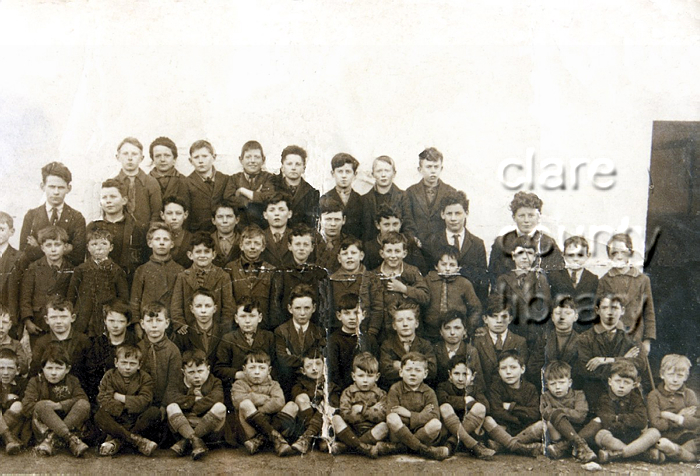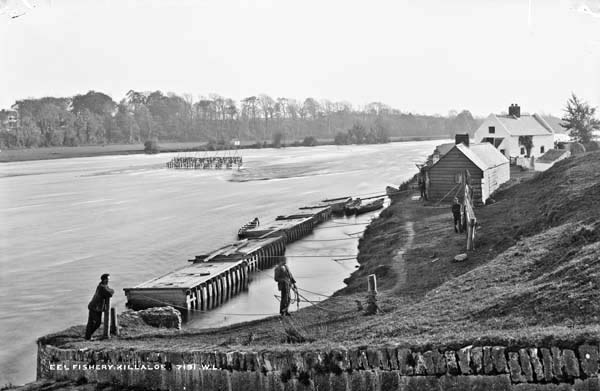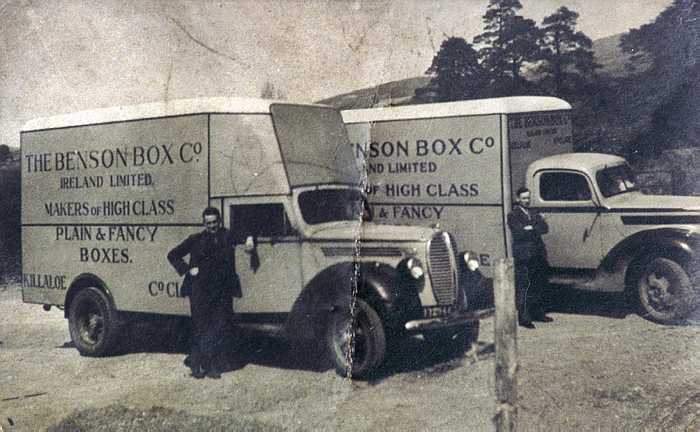You can hear the full interview from the early 1990’s here through Soundcloud!
Next up in the follow up of our Heritage Week event “Sharing Memories” is Tom Grimes. You can read more about the background to these oral history recordings, first made in 1992, here.
Tom Grimes was born in Killaloe in 1923 and married a Killaloe lady, Josie Lucas, whose family were from the Main Street, Killaloe.
He talks about his family’s involvement in fishing and boating on the lake “as far back as he can remember”. Some families in the locality made their living by taking English visitors up the lake fishing and hiring boats out to them.

TOM: As far back as I can remember with Killaloe and my own family, we were always involved in boating and fishing. And getting back to those times, my father, at that time, before the Shannon Scheme, fishermen, they came here from England and all over, to fish here for salmon, because it was well known as a great salmon river.
So there was a lot of families here in Killaloe, including ourselves like, involved in that. They took out these English people fishing. And there had been very fine catches of fish here, up to forty pound salmon had been caught here.
And there were guesthouses here in Killaloe, there was four or five of them, where these people stayed, like, and the father, and other families here, took those people out fishing. So as far back as I can remember, that was the story.
Then my father was involved in boating and rowing. At that time there was fishing cots that they used to row in, and my father and his brother Jack, and Bill Ivis, they rowed here in regattas, for years. And they rowed against Castleconnell men, the Mackeys from Castleconnell, and Sean Carroll the great noted IRA man.
So that was then. The regattas were held here and my father then would go and they’d row in Castleconnell. So as far as that was their life, as far back, with fishing and all that. As far back as I remember, they spent all their time on the lake.
And that’s what they made a living from?
TOM: That’s what they made a living from then, like they hired about their boats to these English people that came over, and they fished with them.

Was there enough men and fishing boats around to take out the tourists?
TOM: Well at that time, there was mainly, it was very easy count the boats if you go back. If you go back forty, fifty year ago in Killaloe, t’was very easy to count the fishing boats at that time in Killaloe. It wasn’t everywhere.
Now, at the present time, I mean, you have clubs here in Killaloe, and every and the young people have taken to the fishing. Ah I suppose you have forty, fifty boats here for pleasure. Now that time. But getting back to the time I’m saying, fifty year ago, there wasn’t any of these boats for pleasure, there were there for – they were making their living, do you know, from the river.
But if all these English tourists come to the hotels and filled the hotels, were they ever disappointed that they couldn’t get out fishing, was it all booked in advance?
TOM: Oh yeah, as far as I know, it was… now I’m not too sure about it but the water was taken over by … I think Whipp was his name, Mr Whip. They lived in Forthenry. So you had these people when they came over here to fish. Number one, they had to have a license, and then they paid whatever fee they had for fishing the warder. The warder for the salmon fishing, I think it was mostly from the lakeside, down below the bridge, that was the best of the salmon fishing.
And did you have to have a license for every rod? How did that work now?
TOM: Oh a license, if there’s two fishing, if there was two men fishing, or many of them, they all needed the license…
Just one license, would cover them for the lot? That would be just while they were here to cover them?
TOM: Yes.
So who would they pay that to?
TOM: Well there was an agent here, I’m sure. Whip was the man who owned the water, Mr Whip like and whether he had an agent here or whether you paid him yourself, or where the office was now, I’m not too sure. So that’s what I can remember about that fishing.
But getting back to, as I say again, the present time, you’ve so many boats here now. You had a few boats here at that time then, at the canal bank. There were Reddans, and there was Ivises then, and they hired out their boats. But as against that, there were no engines. People came in the sun then and you just rowed your boat up as far as Ballyvalley, and hired the boat out for a few hours, and back again then.
Before the Shannon Scheme then, the water wouldn’t have been as high?
TOM: No that would be after the Shannon Scheme, I’d say.
Oh after the Shannon Scheme?
TOM: That’s what I’m saying now about hiring out the boats, McEvoys and all like that. That was after the Shannon Scheme.
After the Shannon Scheme then, that finished fishing in Killaloe. And the people that fished here, they’d made their living from fishing, they were compensated. But what they got in compensation now, was very small, as far as I can remember. The Malones and the Grimes’s and all, whatever I can remember, I think it was around a hundred pound. That’s now as far as I can remember.
When ye knew the Shannon Scheme was going to happen, Tom, did ye realise what it was going to be like? Did ye fishermen realise?
TOM: Well, I think as well, I was only a youngster like that, but I used to hear the father saying, like I mean they knew it was the end of their livelihood.
And did ye try to fight it?
TOM:, Well I mean, there wasn’t much you could do about it, where were you. I mean, It’s different now, if you work in jobs you have unions and all of that but you just had a few fishermen that time, making their living from it and they decided to come along and to start up this thing, Ardnacrusha. T’was the Germans started that So that was it, there was nothing. So they were told they’d be compensated. But I suppose a hundred pounds was a lot of money at that time.

Tom has worked in the Benson Box company for 51 years. He’ll now tell us about what his work was like, and what it’s been like to be there that long.
TOM: I’m a foreman there in the Benson Box company there for so long, and ah it has been a great company to pull through, all during the war years and all like that and. You know during the war petrol was rationed, and our vans were kept going like, and we changed over on the gas at that particular time.
Three of the vans were rigged up like, which contained a cylinder at the side of the van, and it was anthracite, and charcoal was used in the van, which was to take probably a hundred-weight So when you started your journey in the morning, you started off your van on petrol, and when your fire was got going, they formed the gas, you’d change over from your petrol onto the gas.
And I know it was a very slow way of travelling. It was a two day run to Dublin at that time with the vans. And halfway to Dublin, we’ll say Mountrath, you came along and you had to rake out your fire out of the side of the van and refill up, you’re carrying a few bags of anthracite and charcoal, and you’d to refill again, so which brought you the rest of the way into Dublin. So by the time you got your load off and all. T’was a two day journey at that time. And I can remember even at that time, in the war years of 42 or 43, we had to send some of the boxes by rail. And really we hadn’t the petrol to get. And there was a handcart there, that some of the drivers would have to push it from the factory and bring it over to the station in Ballina, which meant three, four, runs with it, to fill up a wagon with a load of boxes, at that time.
So I mean after all the years, I mean it’s a great company, I suppose, to have kept going.
What would you have been earning Tom, when you first went there?
TOM: When I first went, I think sixteen shillings a week. That was my pay, when I first started.
And what, when you first started out, what were you doing?
TOM: Well I went in there, well I tell you, when I first started I was going to the vocational school in Killaloe, which is the Band Hall now, Harry Brann’s. Mr Benson came looking for, he wanted someone to train, so I went in at that time. I left the vocational school.
We used to have a, there were two teachers there, there was woodwork classes there for one half the day, and then we had a teacher there, Mr Comer for the other half, and that’s where I was. So that’s where I went in and started, from there, in the Benson Box. I’m still there.
And you obviously must like it, or you wouldn’t stay all this long.
TOM: Well, I’m at retiring age, and I’m still there. Two years over my age.
So you’re obviously not going to retire?
TOM: Well, the only one thing about it, well it’s very hard at the present time put down. I feel, I’m still able to work and I’m not one of those that could content myself at home every day sitting down, I don’t think so, I prefer to be working.
Obviously, your healthy lifestyle, all your years on the Shannon.
TOM: Yeah, that’s right, I’d be fishing, every weekend, and during the holiday time, and the family were brought up that way, from once they were eight, eight or nine years of age.


